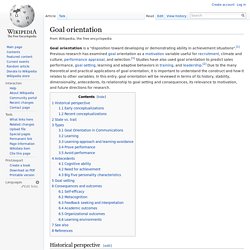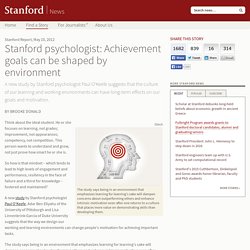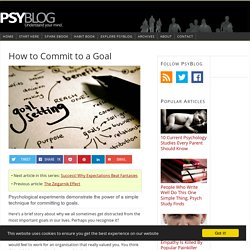

Setting Goals For Yourself, And Motivating Yourself. NapoleonHill Create a Definite Plan. Goal Setting - The WHY behind the WHAT. Our Real Goals In Personal Development-speak we are always talking about goals, outcomes, success, desires and dreams.

In other words, all the stuff we want to do, achieve and create in our world.
Psychology of Achievement. Goal orientation. Goal orientation is a "disposition toward developing or demonstrating ability in achievement situations".[1] Previous research has examined goal orientation as a motivation variable useful for recruitment, climate and culture, performance appraisal, and selection.[2] Studies have also used goal orientation to predict sales performance, goal setting, learning and adaptive behaviors in training, and leadership.[2] Due to the many theoretical and practical applications of goal orientation, it is important to understand the construct and how it relates to other variables.

In this entry, goal orientation will be reviewed in terms of its history, stability, dimensionality, antecedents, its relationship to goal setting and consequences, its relevance to motivation, and future directions for research. Historical perspective[edit] Early conceptualizations[edit] Recent conceptualizations[edit] State vs. trait[edit] Types[edit] Role of Goal Orientation in Leadership Development. Goals can be shaped by environment. Stanford Report, May 10, 2012 A new study by Stanford psychologist Paul O'Keefe suggests that the culture of our learning and working environments can have long-term effects on our goals and motivation.

By Brooke Donald iStock The study says being in an environment that emphasizes learning for learning's sake will dampen concerns about outperforming others and enhance intrinsic motivation even after one returns to a culture that places more value on demonstrating skills than developing them. Think about the ideal student. So how is that mindset – which tends to lead to high levels of engagement and performance, resiliency in the face of failure and a thirst for knowledge – fostered and maintained?
A new study by Stanford psychologist Paul O'Keefe, Adar Ben-Eliyahu of the University of Pittsburgh and Lisa Linnenbrink-Garcia of Duke University suggests that the way we design our working and learning environments can change people's motivation for achieving important tasks. Mental Contrasting. How to Commit to a Goal. Psychological experiments demonstrate the power of a simple technique for committing to goals.

Here’s a brief story about why we all sometimes get distracted from the most important goals in our lives. Perhaps you recognise it? You are thinking about changing your job because your boss is a pain and you’re stagnating. As the weeks pass you think about how good it would feel to work for an organisation that really valued you. 11 Goal Hacks: How to Achieve Anything. Goal-setting research on fantasising, visualisation, goal commitment, procrastination, the dark side of goal-setting and more… We’re all familiar with the nuts and bolts of goal-setting.

We should set specific, challenging goals, use rewards, record progress and make public commitments (if you’re not familiar with these then check out this article on how to reach life goals). So how come we still fail? This psychological research suggests why and what mindsets should help us reach our goals. 1. The biggest enemy of any goal is excessive positive fantasising. 2. The reason we don’t achieve our goals is lack of commitment. One powerful psychological technique to increase commitment is mental contrasting. 3. You can use the Zeigarnik effect to drag you on towards your goal. What the Zeigarnik effect teaches is that one weapon for beating procrastination is starting somewhere…anywhere. 4. 5. When we miss our target, we can fall foul of the what-the-hell-effect. 6. 7. 8. 9. 10. 12 Step Goal Setting Process. 21_Principles_of_Goal_Setting. Personal Goal Setting - Goal Setting Tools from MindTools.
Planning to Live Your Life Your Way Learn how to set effective personal goals.

Many people feel as if they're adrift in the world. They work hard, but they don't seem to get anywhere worthwhile. A key reason that they feel this way is that they haven't spent enough time thinking about what they want from life, and haven't set themselves formal goals. After all, would you set out on a major journey with no real idea of your destination? How to Set Smart Goals. 3 Types of Goals You Should Set in 2015.
As the end of the year draws near, I have a tendency to reflect on the goals I’ve accomplished and start to think about the things I would like to do in the year ahead.

But goals are a tricky thing. Set a bad goal and you could end up wasting time and energy. Set a wrong goal and you could end up in a situation you really didn’t want. For instance, let’s say I set a goal to learn how to code. There’s nothing wrong with coding, right? Why Writing Trumps Positive Thinking Alone for Goal-Setting. Note: This article is Part I of IV of the Be Possible Writing Project Series.

You can craft vision boards, find a year-long intention word or three words or phrase, perform a New Year's Eve I Ching reading, plan and plan and plan, and tell yourself 108 times each morning for a month that you're a good person who deserves a fulfilling life. And still, 12 months later, little beneficial change happens. Little gratification ensues. In fact, some of the above might be counter-productive. Lifetick - Online goal setting made simple.